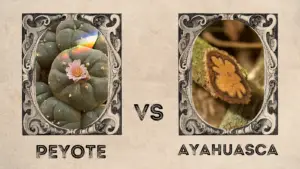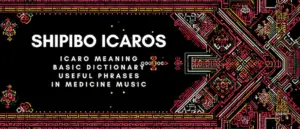The Cosmic Song of the Shipibo: Icaros and the Language of the Jungle
A language that vibrates with the pulse of the Amazon, a tongue woven from the dreams of plants, the murmurs of rivers, and the whispers of spirits older than the stars: The Shipibo language, a Panoan relic spoken by some 35,000 individuals in the Peruvian jungle, is no mere tool of communication—it’s a hyperspatial bridge to the numinous, a sonic tapestry encoding the secrets of the cosmos. Through its sacred songs, the icaros, this endangered language channels the living intelligence and technology of the forest, guiding ayahuasca voyagers into realms where time dissolves and the soul dances with eternity. If this mystery calls to you, consider joining one of our plant medicine retreats, explore our growing Shipibo-English dictionary, and stay tuned for our upcoming song library, .
A Language Forged in the Crucible of the Jungle
The Shipibo language is a filament in the Panoan linguistic web. According to the latest Peruvian census, some 35,000 Shipibo-Conibo people carry this tongue, though its survival hangs by a thread. This is no sterile vocabulary but a living archive of the rainforest’s soul, its words like niwe (air), rao (medicinal plant), and paro (water, ocean) vibrating with the frequencies of the forest itself. These aren’t just terms; they’re incantations, each syllable a fractal of the Amazon’s infinite complexity.
Consider the word pisha, which translates as “to liberate” or “throw away,” yet in the context of icaros, it’s a sonic scalpel, slicing through the psychic detritus of the human condition. Or kano, meaning “connect,” not merely in the mundane sense but as a thread stitching the singer to the plant spirits, the stars, and the ineffable. These words defy translation, for they belong to a worldview where the boundaries between self, nature, and the divine are gloriously blurred. The Shipibo language is a map of this cosmology, born from the land’s own dreaming.
Yet, this linguistic treasure is fading. While 35,000 identify as Shipibo-Conibo, fewer wield the language fluently. The young, seduced by modern, urban life, are drifting from their ancestral tongue. The Shipibo language is endangered—not teetering on oblivion’s edge, but slipping quietly, generation by generation, into silence. To lose a language is to lose a universe, a unique lens on reality, a key to the Gaian mind. But there’s hope, for as ayahuasca gains popularity across the globe, the icaros carry Shipibo’s voice to new ears, rekindling its flame in the hearts of seekers worldwide.
An Oral Symphony of the Invisible
Unlike the rigid scripts of literate cultures, Shipibo is an oral tradition, a river flowing without the anchor of written letters. Missionaries (those earnest interlopers), imposed an alphabet to shepherd Shipibo speakers toward Spanish, but their efforts couldn’t cage the language’s spirit. Its orality is its power, a direct conduit to the jungle’s living intelligence. Words are not frozen on a page but sung, spoken, and dreamed, each utterance a vibration resonating with the cosmos.
Nowhere is this more evident than in the icaros, the sacred songs of Shipibo shamans, or maestros and meastras, who wield them like cosmic tuning forks in ayahuasca ceremonies. Icaros are the “medical jargon” of Shipibo healing, but to call them jargon is to miss their radiance. Where Western medicine’s lexicon is a sterile grid of Latin roots, icaros are a psychedelic poetry, a cascade of images and emotions that transcend the ordinary. They are the language’s highest expression, a synthesis of art, magic, and science that pierces the veil between worlds.
Imagine a Shipibo grandfather, his voice weathered by decades of plant dietas, singing of spirits lurking in the river — entities so subtle they can sicken the unwary. His icaros, steeped in ancient vocabulary, differ from those of a city-bred healer, whose songs might weave urban visions or modern spirits. Each icaro is a unique artifact of the singer’s life, a collage of dreams, encounters, and ancestral whispers. This is not mere music but a technology of the soul, a way to navigate the hyperspace of ayahuasca’s visions.
The Alchemy of Icaros: Art, Science, and Cosmic Precision
To sing an icaro is to wield a laser of intention, a beam of sound that cuts through the chaos of the psyche with surgical precision. As one maestro describes, it’s a dance of discipline and spontaneity, where every word is chosen with the care of a poet yet delivered in the raw immediacy of the moment. Icaros are both scripted and improvised, drawing on years of training while responding to the energies swirling in the ceremonial maloca.
The power of an icaro lies in its trinity of elements: vibration, language, and melody. The vibration is the song’s primal force, a carrier wave for the healer’s intent, resonating with the plant spirits and the cosmos. The language, rich with terms like pana (protect) or joni (people), shapes the song’s purpose—whether to cleanse, heal, or commune. The melody, meanwhile, is the maestro’s response to the moment and to the medicine, a sonic sculpture tailored to the needs of the participants. A heavy, grounding melody might steady a soul adrift in ayahuasca’s currents, while a lilting, ethereal tune could lift a burdened heart into the stars.
This is no haphazard art. Shipibo healers train for years, their senses sharpened by plant dietas that attune them to the subtle frequencies of the jungle. Through these rigorous communions, they learn to feel themselves, their patients, and the invisible currents of the ceremony. The more sensitive they become, the more precise their icaros, each note a calculated act of love and power. To sing an icaro is to speak from the heart’s truth, to choose words and melodies that move the listener—not just emotionally, but ontologically, shifting their very being toward freedom and wholeness.
A Global Renaissance of Shipibo Song
In a world increasingly hungry for meaning, the Shipibo language is staging a quiet renaissance. As ayahuasca ceremonies proliferate, icaros are echoing beyond the Amazon, their melodies touching souls from Berlin to Bali. This global embrace is a paradox: it risks diluting sacred traditions through appropriation, yet it also amplifies Shipibo culture, ensuring its survival. The language’s endangered status makes this moment critical—a chance to share its beauty while safeguarding its sanctity.
At our retreat center, we navigate this paradox with reverence. Our upcoming song library is a digital treasure, offering audio recordings, lyrics, and context for icaros like Niwe torri campana (Air, connection to God, bell) and Joni sowa sowawa (People, clean, clean). Our Shipibo-English dictionary decodes terms like meraya (ancient great shamans) and shinaman (concept, entity, thought), inviting you to explore the language’s mystical depths.
Learning icaros is an act of cultural preservation, a way to keep this endangered language alive. Each word you sing, each melody you hum, is a thread in the tapestry of Shipibo resilience. The global community’s fascination with ayahuasca is not just a trend but a call to action—a chance to honor and sustain a tradition that speaks to the soul of the planet.
Weaving the Future: Education and Immersion
To preserve the Shipibo language, we must do more than listen—we must learn, sing, and dream. At our retreat center, we partner with Shipibo maestra that occasionally visit and lead ceremonies and workshops that delve into the sounds of the icaro, its connection to the jungle, and its role as a healing technology. We approach this work with humility, recognizing that icaros are not mere songs but sacred gifts, entrusted to us by the plants and spirits.
Our upcoming song library is your portal to this journey. With audio, lyrics, and translations, it lets you practice icaros at home, from the cleansing chants of Pisha aketaana to the visionary calls of Nete ani kepenban. Our dictionary complements this, offering a lexicon of terms like torri (connection to God) and kewe (designs, patterns), each entry a key to the Shipibo worldview. Together, these resources empower you to engage with the language respectfully, deepening your connection to its magic.
For the full experience, join our plant medicine retreats. Here, under the jungle’s emerald canopy, you’ll learn icaros from maestros whose voices carry centuries of wisdom. You’ll feel the songs’ vibrations, witness their power in ceremony, and forge a bond with the Amazon’s living spirit. These retreats are not just trips but initiations, gateways to a reality where language, song, and healing converge.
A Call to Sing the Cosmic Song
The Shipibo language and its icaros are a cosmic gift, a reminder that we are not separate from the jungle, the plants, or the stars. They call us to awaken, to sing, to preserve a tongue that speaks the universe’s secrets. Explore our upcoming song library and dictionary to begin your journey. Let the words of niwe and rao dance on your tongue, and feel the jungle’s pulse in your veins.
Join our plant medicine retreats to sing with Shipibo maestros, to immerse yourself in the alchemy of icaros, and to become a steward of this endangered language. The Amazon is calling—will you answer? Share your thoughts or experiences with icaros in the comments below, and let’s weave this cosmic song together.


